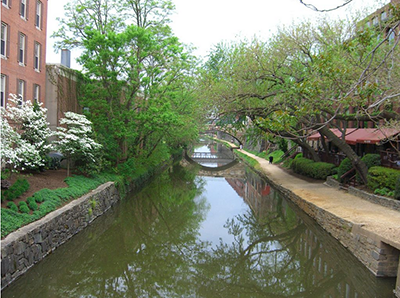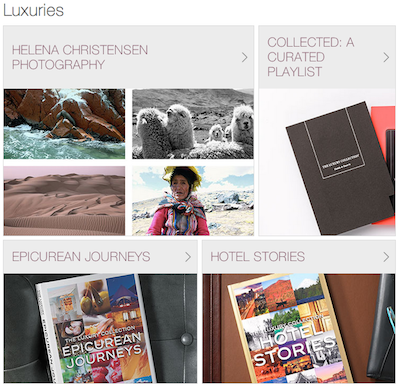 Erica Pelosini in Emilio Pucci spring/summer 2015
Erica Pelosini in Emilio Pucci spring/summer 2015
As the global population continues to rise and economies around the world gain the trappings of a middle-class life, international travel will boom, according to an analysis by Tours.com.
As countries experience more cultural cross-pollination, travel behaviors will evolve. The report identifies six travel personalities or "travel tribes" that may emerge 15 years from now.
"The most influential prediction in the forecast spotlighted here is not how people will travel, but how people will plan their travel," said Lark Gould, content director for Travel-Intel, Los Angeles.
"The study by Amadeus focuses on travel experiences and notes that travel, as a form of leisure entertainment, will be segmented by types of experiences and served to a public according to types of travel experience seekers," she said. "These travel seekers could be those in search of philanthropic tours or Ethical Travel as the study highlights, or those in search of purely indulgent experiences, as Rewards Hunters, or those seeking depth and realism, such as the Cultural Purists noted in the greater break down of six travel personas or tribes.
"And then there are the changes afoot in how travelers will get their information and book their travel. And, if Google’s head of travel, David Pavelko, is right (according to statements made during last summer's Global Business Travel Association conference in Los Angeles), all that planning will be done through a smartphone and probably through a conversation with a Siri-like voice."
Differences
The first travel tribe is "Social Capital Seekers" who are always cognizant of the online reaction to their trips when traveling and who rely on reviews.
 East coast road trip by Fairmont Hotels and Resorts
"Cultural Purists" look to become immersed in utterly foreign environments where the authenticity can be jarring.
"Ethical Travelers" factor morality into their travel plans, whether its by minimizing carbon output or volunteering.
"Simplicity Searchers" prefer already planned trips that assure enjoyment.
"Obligation Meeters" have constraints on time and budget and therefore are highly calculating when traveling, often using technology to optimize trips.
East coast road trip by Fairmont Hotels and Resorts
"Cultural Purists" look to become immersed in utterly foreign environments where the authenticity can be jarring.
"Ethical Travelers" factor morality into their travel plans, whether its by minimizing carbon output or volunteering.
"Simplicity Searchers" prefer already planned trips that assure enjoyment.
"Obligation Meeters" have constraints on time and budget and therefore are highly calculating when traveling, often using technology to optimize trips.
 Curated content from Luxury Collection
Finally, "Reward Hunters" are just looking to indulge after working hard.
Although travelers can be sorted into these categories today, the report argues that they will become more pronounced in the years to come, especially as boundaries dissolve around the world.
Currently, millennials are most likely to seek out customized, adventurous trips, whereas baby boomers enjoy multi-generational, family trips.
Adapting to consumers
Travel industry sales are expected to climb to $671 billion by 2018, and sales booked through mobile are expected to grow approximately 800 percent during this period, according to a new report by L2.
Curated content from Luxury Collection
Finally, "Reward Hunters" are just looking to indulge after working hard.
Although travelers can be sorted into these categories today, the report argues that they will become more pronounced in the years to come, especially as boundaries dissolve around the world.
Currently, millennials are most likely to seek out customized, adventurous trips, whereas baby boomers enjoy multi-generational, family trips.
Adapting to consumers
Travel industry sales are expected to climb to $671 billion by 2018, and sales booked through mobile are expected to grow approximately 800 percent during this period, according to a new report by L2.
A primary driver of this boom will be Chinese consumers traveling abroad. To net as much of this growth as possible, luxury brands will have to ensure that mobile and digital touchpoints are localized and meet escalating consumer expectations throughout the entire travel experience (see story).
As hotel brands improve their digital assets, they will also have to maintain a grip on consumer development.
"For the purposes of today's travel seller or travel marketer, knowing that 'experiences' is the emerging buzzword that is coming out of industry marketing forecasts will go far in getting a jump on market share and leveraging that concept with original spin to gain a better branding foothold," Ms. Gould said. "For instance, if a travel agent knows that the next client coming in is likely to resonate with one or more of the experience categories designated in this study, they can offer up a package of opportunity that will hit all the right buttons," she said. "A Rewards Hunter might might be dazzled with a plan to be met at the airport, driven to a destination resort spa by personal luxury car and driver, set up at the resort spa as a VIP and offered the services of a personal car and driver for at least one day during the stay. "Appealing to a Capital Seeker might involve scrolling popular travel social media sites and learning that a well-followed celebrity is vacationing at a resort sanctuary in, say Belize, offering up that insight to the client and setting up an exciting long weekend. Leveraging the sale of travel according to experience personas makes it easier for the agent to sell travel and also makes the choices easier for clients -- especially if they are being read correctly. The study helps shine a light on what those personas are likely to be moving forward." Final Take Joe McCarthy, staff reporter on Luxury Daily, New York